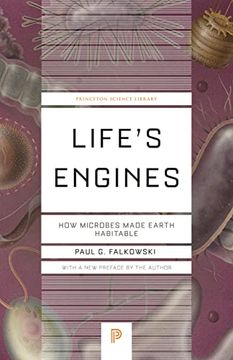Share
Life's Engines: How Microbes Made Earth Habitable (Princeton Science Library, 136)
Paul G. Falkowski
(Author)
·
Princeton University Press
· Paperback
Life's Engines: How Microbes Made Earth Habitable (Princeton Science Library, 136) - Falkowski, Paul G.
Choose the list to add your product or create one New List
✓ Product added successfully to the Wishlist.
Go to My Wishlists
Origin: U.S.A.
(Import costs included in the price)
It will be shipped from our warehouse between
Monday, June 24 and
Wednesday, July 10.
You will receive it anywhere in United Kingdom between 1 and 3 business days after shipment.
Synopsis "Life's Engines: How Microbes Made Earth Habitable (Princeton Science Library, 136)"
The marvelous microbes that made life on Earth possible and support our very existence For almost four billion years, microbes had the primordial oceans all to themselves. The stewards of Earth, these organisms transformed the chemistry of our planet to make it habitable for plants, animals, and us. Life's Engines takes readers deep into the microscopic world to explore how these marvelous creatures made life on Earth possible--and how human life today would cease to exist without them. Paul Falkowski looks "under the hood" of microbes to find the engines of life, the actual working parts that do the biochemical heavy lifting for every living organism on Earth. With insight and humor, he explains how these miniature engines are built--and how they have been appropriated by and assembled like Lego sets within every creature that walks, swims, or flies. Falkowski shows how evolution works to maintain this core machinery of life, and how we and other animals are veritable conglomerations of microbes. A vibrantly entertaining book about the microbes that support our very existence, Life's Engines will inspire wonder about these elegantly complex nanomachines that have driven life since its origin. It also issues a timely warning about the dangers of tinkering with that machinery to make it more "efficient" at meeting the ever-growing demands of humans in the coming century.
- 0% (0)
- 0% (0)
- 0% (0)
- 0% (0)
- 0% (0)
All books in our catalog are Original.
The book is written in English.
The binding of this edition is Paperback.
✓ Producto agregado correctamente al carro, Ir a Pagar.

